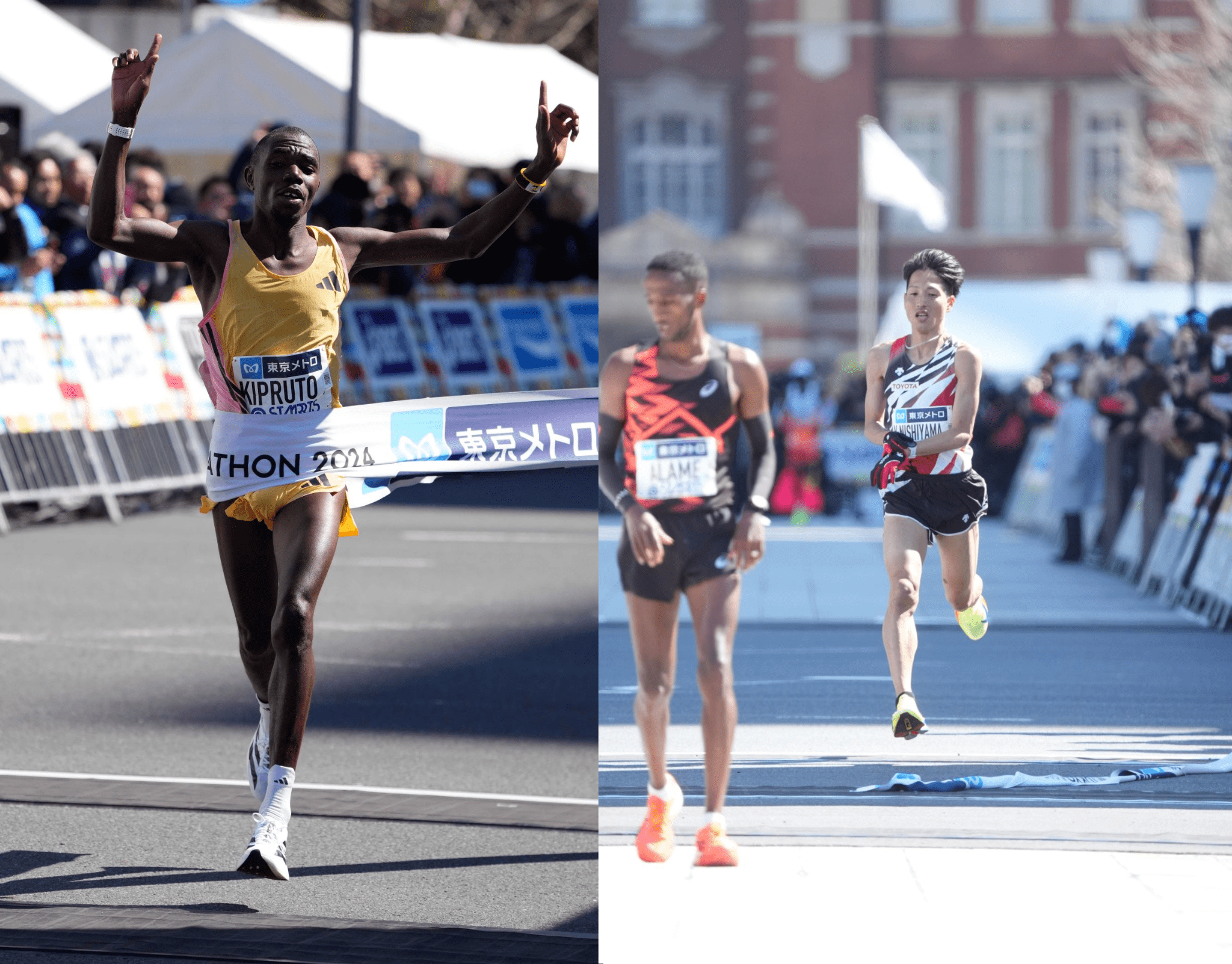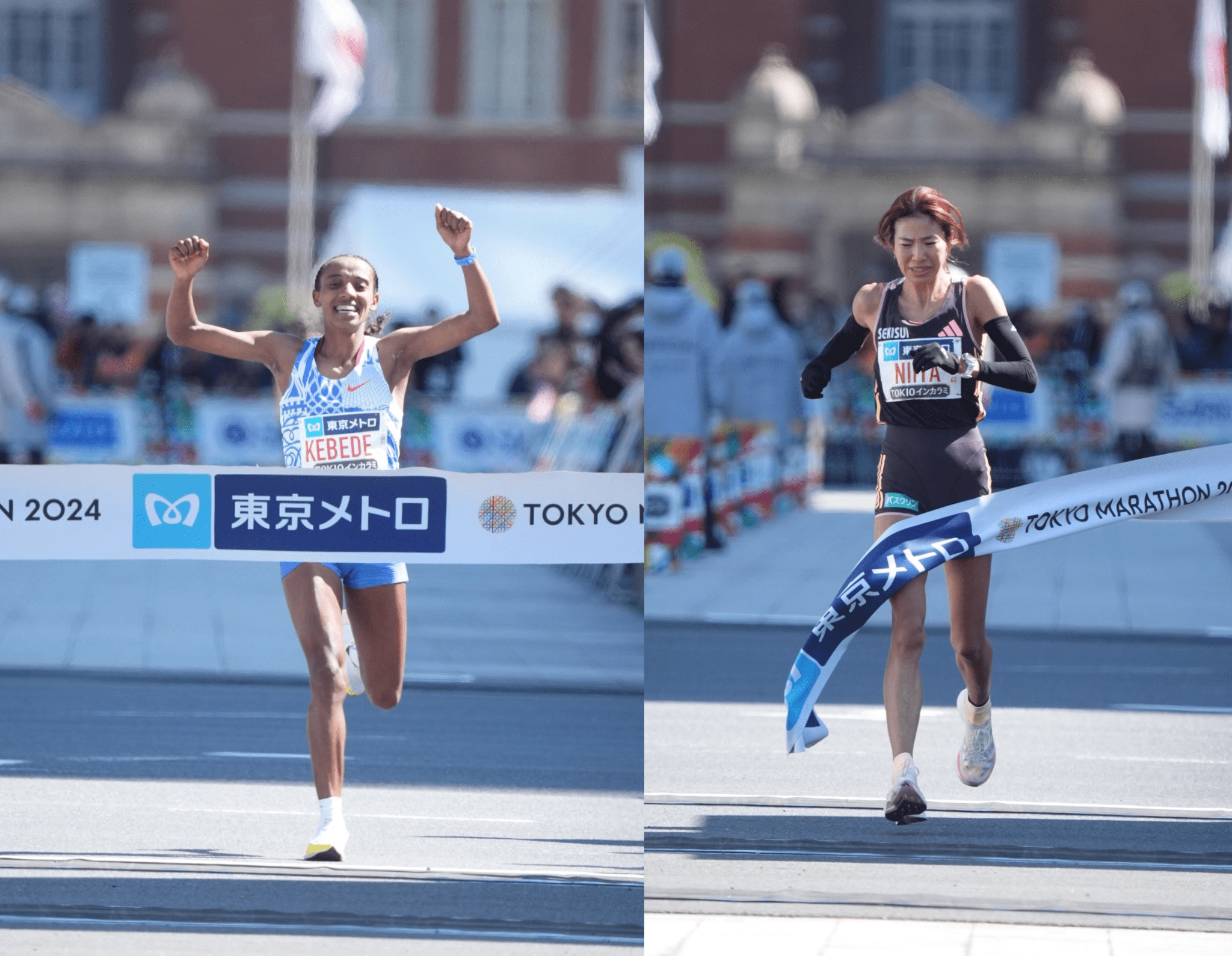At the start of the race, it was sunny with temperatures at 9.6℃ and 22% humidity. Temperatures remained stable and the weather conditions were quite favorable.

In the men’s field, Benson Kipruto (Kenya) won his first Tokyo Marathon with a time of 2:02:16, setting a course record, fastest finish time in Japan, and the fifth fastest time in the world. This is his third win in an Abbott World Marathon Majors event, following the Boston Marathon 2021 and Chicago Marathon 2022. He shared his joy commenting, “I am happy to have set a new event record. I am happy. It was an enjoyable run.“
It was a fast paced race from the start, marking 14:16 at 5km, 28:30 at 10km, and 42:52 at 15km. The leading pack was made up of 4 runners from Kenya - Kipruto, Timothy Kiplagat, Vincent Kipkemoi Ngetich and the former world record holder Eliud Kipchoge.
Kipchoge began to fall behind from the leaders before the 20km mark, and 3 runners remained in competition for the win. At the 27km mark, Kiplagat took the lead at a potential new world record pace. Kipruto caught up to Kiplagat at the 32km mark, and the pace slowed down as they kept an eye on each other. From 35km, it became a one on one duel between Kipruto and Kiplagat, with Kipruto picking up the pace at 38km. He maintained his lead and beat the course record of 2:02:40 set by Kipchoge in the Tokyo Marathon 2021 (held in 2022).
When asked about the fast pace up to 30km which had the potential to exceed the world record, he stressed that it was a result of extensive practice. “I didn’t realize this was the case. It would not surprise me if I had broken the world record. I had been preparing for that.“
Kiplagat placed second with 2:02:55, and Ngetich placed third at 2:04:18. While he slowed down to a pace of 15:30 to 15:40 per 5km after the 20km mark, Kipchoge finished the race in 10th place with a time of 2:06:50.
For the Japanese men, the Tokyo Marathon is the only remaining “final challenge” race of the Marathon Grand Championship for the last spot on the Japanese men’s marathon representative for Paris 2024, and they were aiming for a time under the designated 2:05:50.
Around the 33km mark, Yusuke Nishiyama (Toyota Motors) took over from Yuhei Urano (Fujitsu) who had been leading the Japanese men, hoping to meet the designated time. However, he was unable to pick up the pace and finished 9th with a time of 2:06:31, missing out on the ticket to Paris. While he improved his personal best by 1:16, he showed tears after the race. “I wanted to go to the Olympics. I’m frustrated because it was meaningless unless I ran under 2:05:50.“
Kenya Sonota (East Japan Railway Company) placed 11th with a time of 2:06:54 placing second among the Japanese men. Japanese record holder Kengo Suzuki (Fujitsu) placed 28th with a time of 2:11:19 after slowing down considerably after the 30km mark. Suzuki recapped the race “I was challenging myself for Paris, but it didn’t happen. I am very grateful for all the support.”
Ichitaka Yamashita (Mitsubishi Heavy Industries, Ltd.) who is led the Japanese men’s field last year, fell behind the pack at 8km and placed 46th with a time of 2:17:26.

In the women’s field, Sutume Asefa Kebede (Ethiopia) won her first Tokyo Marathon at 2:15:55, breaking the record of the fastest finish time in Japan and course record. She smiled at the unexpected result. “I am very happy. I hadn’t thought about breaking the course record until the halfway point.”
From the 25km mark, it was a three-way competition between Kebede, Rosemary Wanjiru (Kenya) who won last year and Amane Beriso Shankule (Ethiopia). Shankule fell behind, and Kebede picked up the pace beyond 40km, leaving Wanjiru behind and maintaining the lead to the finish. She beat the course record of 2:16:02 set by Brigid Kosgei in 2021 Tokyo Marathon (held in 2022), Kebede shared that she put in all of her power at the end commenting, “There was a lot of strategizing. I tried my best for a last spurt of speed.”
Wanjiru placed second with a time of 2:16:14 and broke her personal record of 2:16:28 which allowed her to win last year. Shankule placed third with a time of 2:16:58.
Sifan Hassan (Netherlands), who has the second fastest world record, placed fourth at 2:18:05. She fell behind the leaders around 20km and slowed down after the 25km mark.
Although she led the Japanese women, Hitomi Niiya, who was hoping to set a new Japan record, slowed after the 30km mark and placed sixth with a time of 2:21:50. “I didn’t get the results. Nothing more and nothing less”, she commented.




























